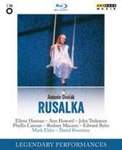|
Back
01/02/2016
Antonín Dvorák: Rusalka, B. 203
Eilene Hannan (Rusalka), John Treleaven (The Prince), Rodney Macann (The Water Spirit), Ann Howard (Jezibaba), Phyllis Cannan (The Foreign Princess), Catherine Pope/Eileen Hulse/Linda McLeod (Wood Nymphs), Fiona Kimm (The Kitchen Boy), Edward Byles (The Forester), Christopher Booth-Jones (Voice of a Huntsman), Dancers, Chorus and Orchestra of the English National Opera, Martin Handley (Chorus Master), Mark Elder (Conductor), David Pountney (Stage Director), Terry John Bates (Choreography), Lynn Holm (Makeup Designer), Nick Chelton (Lighting Designer), Derek Bailey (Videotape Director), Graham Carr (Videotape Editor)
Recording: English National Opera, London, England (1986) – 158’24
Arthaus Music #109149 (or Blu-ray #109150) – Sound PCM Stereo – Format NTSC 4:3 – Region 0 – Booklet in German, French and English (Distributed by Naxos of America)

   
Anything resonating of fables or fairy tales pushes the envelope of infinitesimal values. Ambiguity, as it relates to time, allows a director greater freedoms to interpret within this operatic theme. Thus, we have a Britannic case made to translate Dvorák’s most successful and popular of his operas by David Pountney back in 1986. A good argument can be made in favor of this production with its modicum of edgy morbidity and downright surrealism, while tastefully tailored.
Staging by the English National Opera honors its foundational underpinnings by performing Rusalka in the venue’s native language. This operatic counter-protocol however translates the wording into English that doesn’t dilute the impact and severity of the story. Mr. Pountney uses a monochromatic palette dating back to the Victorian Era, anchored by a nursery (in Acts I and III) and placing Rusalka in an oneiric state that carries with it its own onerous and macabre point-of-view.
A distant Liv Ullmann look-alike, Eilene Hannan makes the most of her surroundings with a voice bathed in effortless, sonorous richness while expressing youthful reveries for John Treleaven’s love in the role as The Prince. Seldom does Hannan overdramatize. But the sense of helplessness within Act II, as she deals with her dumbness while encased within a swiveling Plexiglas room, creates stifled and oppressive overtones that swells the audience to unprecedented pathos and empathy. Ms. Hannan’s “Song to the Moon” radiates richness...her earthy timbre is highly celestial and politely restrained with passion.
Her fellow nymphs, Catherine Pope, Eileen Hulse and Linda McLeod, mix with lustrous blend, bringing back blushes of Wagner’s Das Rheingold Rhinemaidens (1862.) Just as Wagner seeps into the score, so, too, do Debussy’s dreamy motifs. Mark Elder handles Rusalka with tenderness and acceptable pacing even at the extraordinary youthful age of only 39.
The human world undoubtedly centers around John Treleaven as The Prince. He encases Dvorák’s notes with clarion projection and substance. Though his tenor voice has strength, the character has a sense of distance and doesn’t convincingly express seeping passion with Rusalka. So too, goes with Rodney Macann as The Water Spirit: the delivery is excellent, forceful and watchful, but it withholds extremism. Perhaps British culture, as a whole, has something to do with a blanketed pulse of starchiness and stoic rigidity. Yet again we are reminded that this Rusalka is set in Victorian times.
Ann Howard fits well inside the diabolical black dress, evincing unflinching matronly values as Jezibaba the Witch. The mezzo voice is broadly ominous, and she has fabulous inflections while interfacing with the amusing and buttery voices of Fiona Kimm and Edward Byles as the Kitchen Boy and Forester, respectively.
"Cleverly entertaining" can be said about Terry John Bates’ choreography, especially when the curtains lifts on Act II: one feels one's inside a kitchen sanitarium with assistants looking like faceless Raggedy-Ann nutcases that create twisted comic morbidity. Bates’ most clever blocking follows with veiled wedding guests, en blanc, entering and dancing to close imagery of My Fair Lady’s “Ascot Gavotte.” Rusalka’s inability to marry The Prince is emotionally gripping by surrounding her with children dressed as groomsmen and flower girls while amorous entrées ensue between The Prince and The Foreign Princess.
If not by mere presence alone, Phyllis Cannan’s powerful voice is mighty and claustrophobic. While much of the action and intense singing occurs inside Act II’s transparent cubicle, Mr. Pountney, however, shoots himself in the foot with annoying sound reverberation and inconsistent volumetric control.
One hears distracting noises (i.e. moving sets, creaky floors, cue instructions obliquely garbled in the background, erratic sound intensity.) Act II begins with crisper sound quality than in Act I. But the irregularities continue throughout. Judge this production and recording with a broadened perspective...one can forgive for the performers deliver a powerfully effective performance. Audiences will be magnetized by Mr. Pountney’s vision.
Christie Grimstad
|